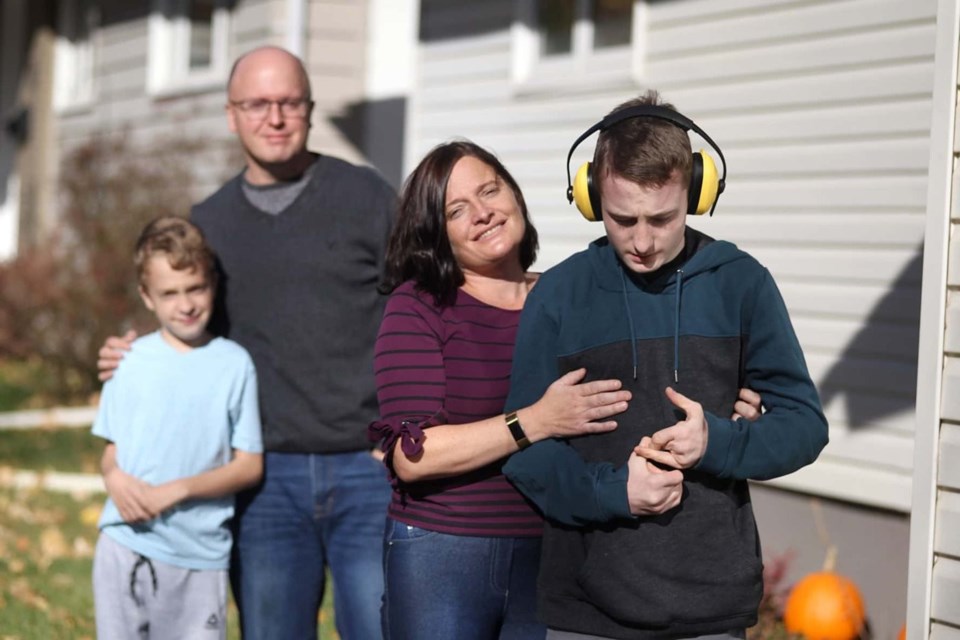A Brandon woman says her “worst fear” came true Friday, when she learned her 16-year-old son, who has a global developmental delay and severe autism, had tested positive for COVID-19.
Now, Taja Lonstrup is anxiously waiting to find out if any of her son’s peers or support staff in the Life Skills program at Neelin High School have also contracted the virus.
“We’re very worried about the other kids and, of course, worried about staff,” Lonstrup said during a phone call from her home in Brandon, where her family of four is self-isolating.
Over the weekend, Manitoba Public Health issued a notice about a potential novel coronavirus exposure at Neelin on Oct. 2. The bulletin states there is no evidence the infection was acquired at school.
Her oldest son, Ross, started showing symptoms Oct. 4, after the teen came home from weekend respite care, his mother said, adding his initial symptoms of a sore throat and fever transitioned to vomiting last week.
The teenager got tested Oct. 5, and the family has been self-isolating since. On Oct. 9, the Lonstrups received the result.
After the long weekend, he was jumping on the trampoline — a positive sign for his health, Lonstrup said Tuesday, although she is now feeling achy and exhausted. Lonstrup, her husband, and their younger son initially tested negative for the virus; Lonstrup said she plans to take another test.
Lonstrup said she is unaware if any school community members have tested positive — but is worried because her son, along with some of his classmates, cannot properly wear a face mask. Some of the students enrolled in the program that equips students with disabilities with both academic skills and work experience, are also high risk, and do not understand physical distancing, she said.
Lonnie Patterson, spokeswoman for the Canadian Union of Public Employees Local 737, confirmed Life Skills is facing a staffing shortage, as eight of its 26 educational assistants are currently self-isolating. (Lonstrup said she was told 10 staff members are self-isolating; public health officials did not provide information before deadline Tuesday.)
“Everyone is working as hard as they can to maintain social distancing when possible, and maintaining cohorts, but the reality of a Life Skills classroom and working with students who do have additional and sometimes, exceptional needs, is that you are working very closely with them,” said Patterson, a substitute EA, who spoke Tuesday on behalf of the union that represents Brandon School Division support staff.
While Patterson said the BSD has equipped staff with personal protective equipment, even pre-pandemic there wasn’t enough funding to offer students with disabilities the support they need — and COVID-19 has made staffing shortages worse.
Superintendent Marc Casavant was not made available for an interview Tuesday. In a statement, Casavant listed the measures in place to keep Neelin students safe, including setting up student workspaces two metres apart, sanitizing work stations after each use, and equipping staff with the appropriate level of PPE, depending on whether the students they work with are deemed low, medium or high risk.
Lonstrup has requested a meeting with the division and sent a letter to Manitoba Education.
She had raised questions about back-to-school planning since the summer. Even though community transmission has not been confirmed at Neelin, Lonstrup is renewing calls for remote learning options, one-on-one support for students with disabilities at home, and creative ways to make room for physical distancing, such as renting out community centres.
“Our feeling is we’ve been overlooked and that planning for our kids and adults with disabilities hasn’t really taken place,” Lonstrup said, adding she was hesitant to send her children to school this year because she is high-risk, owing to a stroke history.
A spokesperson for Manitoba Education said the province does not provide details about individual cases. In a general statement, the spokesperson wrote divisions continue to co-ordinate with the province “to work together to address the challenges that special needs students may face during a COVID-19 school year.”



